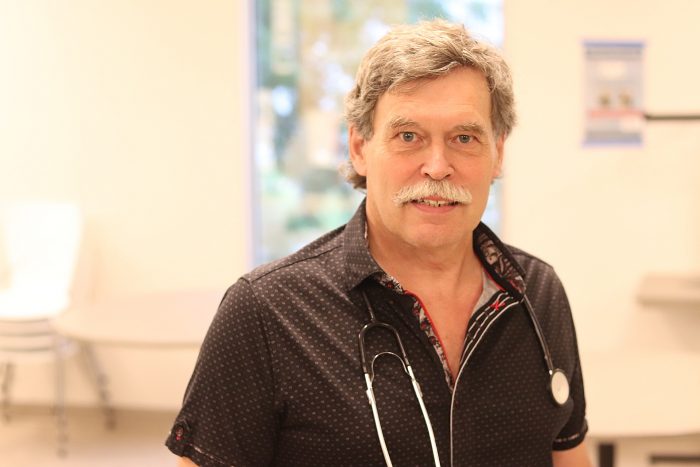Reformulated and patented version of well-known generic drug could prove to be a quick, safe and cost-effective way to accelerate recovery and prevent hospitalizations.
The fight against COVID-19 must be waged on many fronts. The public’s adherence to infection control measures is essential, and so is the search for a vaccine. But even when one is found, cases will not disappear, and many patients will still need treatment. In that sense, repurposing drugs could be a quick, safe and cost-effective way to develop new COVID-19 therapies. In the fall, a large phase III randomized clinical trial sponsored by the Research Institute of the McGill University Health Centre (RI-MUHC) could start testing the efficacy of a reformulated generic drug in COVID-19 positive outpatients to mitigate severe pulmonary inflammation caused by the SARS-CoV-2 virus and consequently, to reduce hospital admissions. Dapsone is a decades-old safe and affordable oral antibacterial that has well-recognized anti-inflammatory and immuno-modulatory properties used against malaria, lupus, HIV and many other inflammatory infections.

“While aggressive mitigation strategies are being implemented to slow the spread of SARS-CoV-2, we must also concentrate our efforts on developing and implementing scientifically sound drug candidates using high-quality randomized controlled trials,” says Dr. Jean Bourbeau, who is a senior researcher at the RI-MUHC, a respirologist at the McGill University Health Centre and the study’s principal investigator. “Reformulating an existing drug has many advantages. The metabolic, pharmacokinetic and toxicological properties of dapsone have been well documented, so we understand its mechanism of action, how it’s absorbed by the body and how it might minimize the inflammatory process in the lungs and reduce COVID-19 complications that lead to hospital admissions, intubation, intensive care and mortality. We also know its side effects, which could help us avoid prescribing it to at-risk patients.”
Repurposing an existing drug for a new indication has the added benefit of allowing researchers to jump straight to phase III of a clinical trial and evaluate the efficacy and safety of the reformulation with minimal investment of time and money. Furthermore, because there are no associated research and development expenses, generic drugs cost considerably less than new prescription medications.
The Dapsone Coronavirus SARS-CoV-2 Trial (DAP-CORONA) COVID-19 study is a randomized, triple blind, placebo-controlled, parallel, multicentre trial which will evaluate the efficacy and safety of a new version of dapsone developed and patented by Pulmonem, a Canadian biotech start-up.
The repurposed drug will be administered at the early stages of the disease in symptomatic outpatient adults to tone down what is known as the cytokine storm triggered by COVID-19.
“Cytokines are proteins produced by white blood cells that help coordinate the body’s immune response. But sometimes, the immune system overreacts, and excessive levels of cytokines are released, resulting in hyperinflammation. Because of its anti-inflammatory, immunomodulatory and immune-suppressive properties, dapsone works on the adherence of immune cells called neutrophils to prevent the release of cytokines,” says Dr. Bourbeau, who is also a professor at McGill University. “By administering the drug as soon as symptoms start, we hope to attenuate the lung inflammation that is the most frequent cause of worsening symptoms and complications requiring hospitalization.”
The DAP-CORONA trial is slated to start in late September. Over 2 000 symptomatic outpatients – adults aged 70 and older and younger adults with at least one high-risk comorbidity – will be recruited in seven centres across Canada and the United States. The team of international researchers led by Dr. Bourbeau will use a novel platform to screen, get consent and monitor participants remotely for efficacy and safety. Results should be available before the end of 2020.
According to Dr. Bourbeau, immunomodulatory agents such as dapsone could turn out to be a significant advancement in COVID-19 therapeutics.
“With the need to prevent complications leading to hospital admissions and the absence of proven effective treatments for COVID-19 outpatients, showing that dapsone has a net clinical benefit should be a public health priority.”
This clinical research will be partially supported by the McGill University Health Centre Foundation.
“Our foundation is determined to help the scientific community find a cure for COVID-19 and end this pandemic. It has committed to raising funds to help support this study, which aligns with our mission to transform health care and change the course of lives and medicine through innovation,” says Julie Quenneville, President of the MUHC Foundation. “Ensuring the safety and efficacy of new therapeutic interventions such as this will provide our physicians with the tools they require to fight COVID-19 and save lives.”
The Research Institute of the McGill University Health Centre (RI-MUHC) is a world-renowned biomedical and healthcare research centre. The Institute, which is affiliated with the Faculty of Medicine of McGill University, is the research arm of the McGill University Health Centre (MUHC) – an academic health centre located in Montreal, Canada, that has a mandate to focus on complex care within its community. The RI-MUHC supports over 420 researchers and close to 1,200 research trainees devoted to a broad spectrum of fundamental, clinical and health outcomes research at the Glen and the Montreal General Hospital sites of the MUHC. Its research facilities offer a dynamic multidisciplinary environment that fosters collaboration and leverages discovery aimed at improving the health of individual patients across their lifespan. The RI-MUHC is supported in part by the Fonds de recherche du Québec – Santé (FRQS).
The McGill University Health Centre (MUHC) Foundation raises funds to support excellence in patient care, research and teaching at the MUHC. Our Foundation created a COVID-19 Emergency Fund to allow the MUHC to rapidly launch critical research projects to end this virus as well as support the tireless efforts of our hospital staff in the face of this pandemic. With your help, we are taking immediate action and focusing on preventing and curing the disease.
Media contact:
Gilda Salomone
Senior advisor, Media relations
McGill University Health Centre
C: 514-377-4996
September 2 2020

